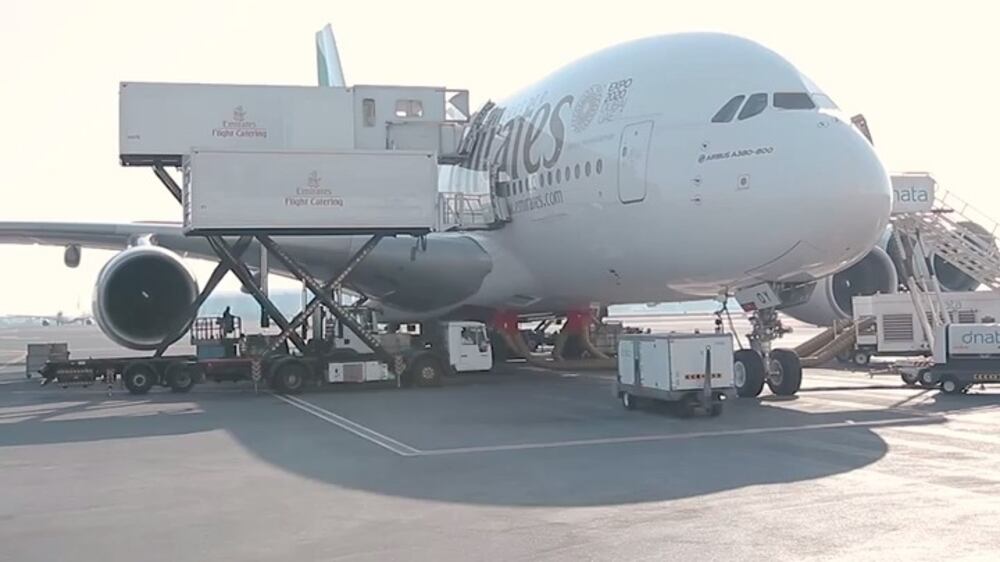Emirates, the world’s biggest carrier by international traffic, will suspend most of its passenger flights starting March 25 due to the “unprecedented” impact of the coronavirus outbreak that has battered air travel demand and led to border closures.
The Dubai airline will continue to operate only about a dozen passenger flights after having received requests from governments to repatriate travellers.
These flights will be operated "as long as borders remain open and there is demand", Emirates said on Sunday. It will operate passenger and cargo flights to Switzerland, Hong Kong, Thailand, Malaysia, Japan, Singapore, Australia, South Africa, Canada, South Korea, the UK, US and Philippines.
The airline continues to monitor the situation closely, Emirates said. It will continue to operate all its cargo flights.
"As a global network airline, we find ourselves in a situation where we cannot viably ope rate passenger services until countries re-open their borders, and travel confidence returns," Sheikh Ahmed bin Saeed, Emirates Group chairman and chief executive, said.
The move is a major step in the Gulf giant's 30-year history, which spanned two Gulf wars and a Sars epidemic, highlighting the extent of the toll that Covid-19 has taken on the global aviation industry. Emirates' hub model relies on connecting international traffic through its base in Dubai which has earned the emirate the title of the world's busiest international airport for six consecutive years.
Airlines around the world have slashed capacity, axed jobs and issued pleas for government support in order to survive the pandemic, which presents the greatest challenge to the aviation industry to date.
Emirates is taking a series of cost-reduction measures, amid a "weak" outlook for travel demand across markets in the short-to-medium term, but will not cut jobs.
The majority of the group’s 100,000-strong staff will take a 25 per cent to 50 per cent reduction in salaries for three months, but will continue to be paid other allowances during the period. Junior employees will be excluded from the salary cuts.
Emirates president Tim Clark, who was scheduled to step down from his role in June, and Dnata president Gary Chapman will take a full cut on basic salary for three months.
Other cost cuts include a freeze on non-essential hiring and consultancy work, negotiating cost savings with suppliers, encouraging employees to take paid or unpaid leave and postponing or cancelling “discretionary” spending.
“We want to avoid cutting jobs,” Sheikh Ahmed said. “When demand picks up again, we also want to be able to quickly ramp up and resume services for our customers.”
Sheikh Ahmed said with Emirates Group's strong balance sheet and substantial cash liquidity the company "can, and will, with appropriate and timely action, survive through a prolonged period of reduced flight schedules, so that we are adequately prepared for the return to normality."
The chairman said the airline will “get through” these “unprecedented times” even though the business is “taking a hit".
“I’m confident that Emirates can tackle this challenge and come out stronger,” Sheikh Ahmed said.
Emirates is “better placed than many around the world,” said Saj Ahmad, chief analyst at StrategicAero Research. “This situation is something no one could have ever foreseen. Emirates is reacting in the only way it can – and that is by moving fast and moving now to suppress costs and avoid compulsory layoffs.”
“With all corners of the globe effectively locking down cities, justifying operations has become so difficult that flights in some cases simply could not proceed,” Mr Ahmad said. “In avoiding any staff furloughs or job cuts, the decision to reduce pay yet retain other benefits for staff, Emirates is acutely aware that at some point, demand will return and they will need their human resources and staff to help reinstate flights across its network .”
Some staff said they had not anticipated a full passenger flight shutdown, even though routes had been steadily cut for weeks but were thankful for how management is addressing the situation.
"This is the situation for so many companies. They have done what they needed to do," one pilot said on the condition of anonymity. "I'm lucky to be working for a company like Emirates who takes care of their staff. I'm proud of the company and in these situations they always have a plan B not only for the company but also for the staff. We are still standing on our feet. Now we will have to see what happens over the next few weeks."
With additional reporting by Ramola Talwar Badam








